IRLS 585 Tutorial
A brief look at how to conduct basic library research for an English 101 or 102 research paper on a social issue or contemporary topic. Upon completion of this tutorial, the student will be ready to utilize results from an EBSCO host search in a research paper. My intention here is to present what I might present in about one-half hour of class time during any given semester. These are the steps I find myself repeating, as an English Instructor, with students who are new to the ASU library.
My tutorial's objectives are: 1) Learn to locate Ebsco Database within the ASU Library Online Catalog. 2) Within the Ebsco database, learn to perform a basic keyword search. 3) Once you've performed a search, learn how to refine the results in very simple and useful ways. Future tutorials might well deal with such concerns as printing articles or abstracts, using multiple keywords or boolean operators for keyword searching, or other 'library specific' processes (i.e. e-mailing, printing, and such).
 Perhaps the first thing a student in English 101 or English 102 needs when confronted with a research essay is access to library resources about the essay's subject. This project is an attempt to deal with those very students. Students in this situation often ask such questions as: What library resources should I consult? How might I find sources that are current enough to report the most recent status of social issues? Isn't the World Wide Web and the proliferation of pages on my topic enough? How can I just look at 'full-text' articles and not wade around in actual library bound volumes?
Perhaps the first thing a student in English 101 or English 102 needs when confronted with a research essay is access to library resources about the essay's subject. This project is an attempt to deal with those very students. Students in this situation often ask such questions as: What library resources should I consult? How might I find sources that are current enough to report the most recent status of social issues? Isn't the World Wide Web and the proliferation of pages on my topic enough? How can I just look at 'full-text' articles and not wade around in actual library bound volumes?
So your instructor has asked you to write an argument essay concerning a current issue and to use some articles to support your main points. Since the issue is contemporary and likely changing on a day-to-day basis, published books in the library may not contain the latest information. Say, for instance, you want to investigate the issue of gun control. Your first inclination may be to look on the World Wide Web and use some information from sites found there. The problem with that choice, in my opinion, is that much of the information found on the Web will contain a 'spin' from one point of view. What you need, in reality, is recently published articles from newsmagazines and other contemporary sources. Don't give up hope, however. There is a resource, available to all students at ASU, which will give you access to information that is nearly 'up-to-the-minute.'
This resource is called Ebsco Academic Search Premier and is an amazing help for folks seeking current reference material. According to the database help section: "Academic Search Premier,designed specifically for academic institutions, is the world's largest scholarly, multi-disciplinary full text database containing full text for nearly 4,700 publications, including more than 3,600 peer-reviewed publications. In addition to the full text, this database offers indexing and abstracts for nearly 8,200 journals in the collection."
You don't have time to physically go to the ASU library so you go to http://www.asu.edu/lib. Alternatively, if you're in the ASU library, you simply navigate to the library homepage by clicking on Microsoft Internet Explorer.
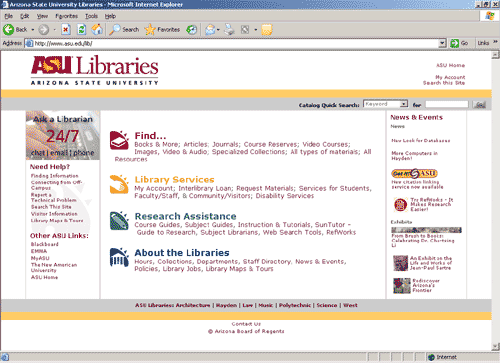
Once you're at the Libraries homepage, you want to click on the find articles link. This will take you to a screen where you can find a relevant index.
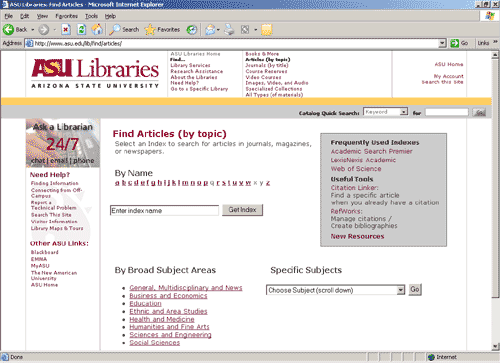
Then, in the "Get Index" search box you need to type in the name "ebsco." This will take you to a new "Find Articles" window where the top line says "Academic Search Premier (EBSCOhost)."
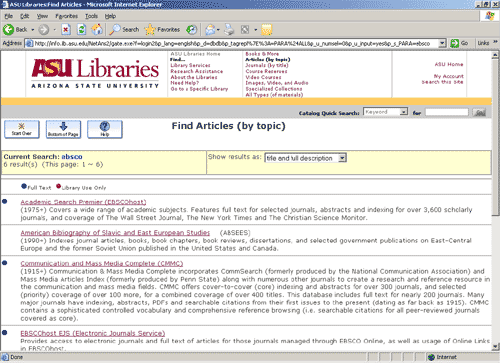
Please click on this link. This will lead you to a page which describes the database itself. Finally, when you click on the line that says "Academic Search Premier," you'll be taken to an authorization screen since you are off campus.
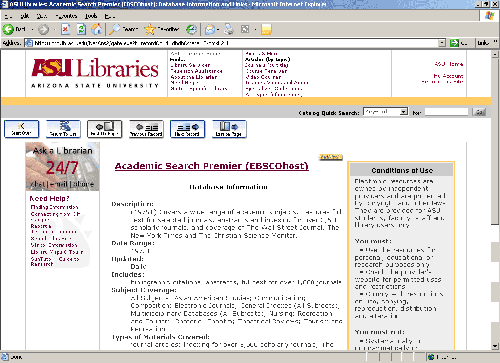
At this authorization point you will be asked to provide your ASURITE identification and password (again this only happens if you're off-campus).
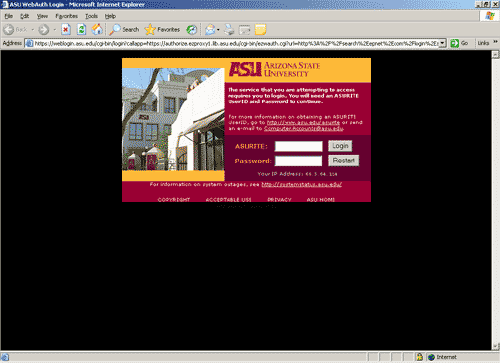
At last, with these steps performed, we reach the Academic Search Premier Basic Search Screen:
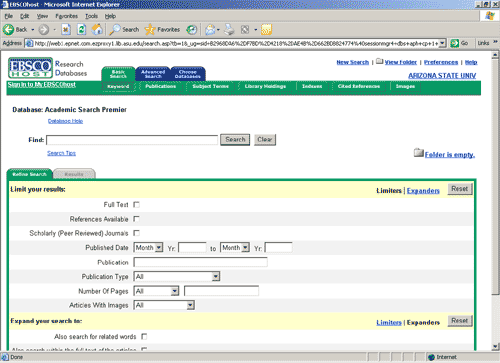
 Why look in Academic Search Premier as opposed to other library databases? What makes this database more authoritative than a website? The reasons for using Ebsco a many. First and foremost, we're looking for information that is current and general in scope. Journal research is better done in specialized databases, but broader interests, like contemporary issues, make Ebsco a good fit. Timeliness of sources is critical in contemporary issues. For example, a student investigating the Iraq situation needs information that is updated daily. So many of the sources that one finds on the World Wide Web contain views of unmoderated individuals with the time and money to put up a website. Putting up a website does not, however, make one an expert on international affairs or even Hollywood romance.
Why look in Academic Search Premier as opposed to other library databases? What makes this database more authoritative than a website? The reasons for using Ebsco a many. First and foremost, we're looking for information that is current and general in scope. Journal research is better done in specialized databases, but broader interests, like contemporary issues, make Ebsco a good fit. Timeliness of sources is critical in contemporary issues. For example, a student investigating the Iraq situation needs information that is updated daily. So many of the sources that one finds on the World Wide Web contain views of unmoderated individuals with the time and money to put up a website. Putting up a website does not, however, make one an expert on international affairs or even Hollywood romance.
Once you're in Academic Search Premier, life is good. This database will help you to narrow your search in many ways. Let's begin with a basic search. I'm going to check the box that says "Full-Text". By checking this box you can be certain the computer will only return relevant references that offer full-text access within the database itself. Now let's run an actual search. Bear in mind that search results will always be changing so you might not see exactly the same results twice. Let's look at the topic of "gun control" and see how many full-text articles we find. Here's how your screen should look before entering the search:
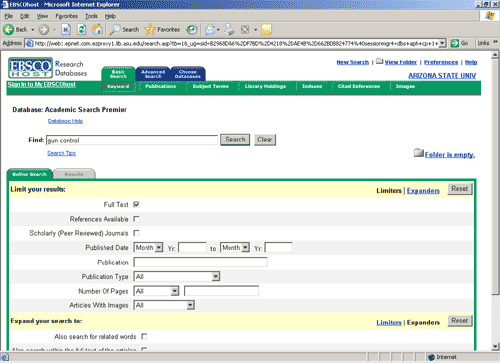
Presented below is the results of this search on November 15, 2005:
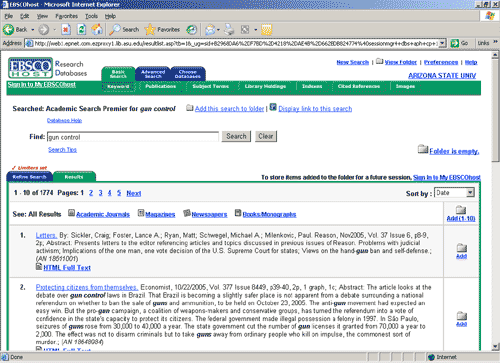
As of today this search returns 1774 articles. "Whew," says the researcher, there will be plenty to write about here and further research is not likely a necessity. What's even better about each of these individual articles is that they can be printed or e-mailed to your e-mail address. Let's 'kick this search up a notch' by adding more requirements to it. Now we want articles with "references available" that appear in "peer-reviewed" journals. What do these terms mean and how might this improve our search? These questions are answered here. By simply checking the two appropriate boxes beneath the search box we can filter for these requirements. You might be wandering, why not just add more words to the keyword search? I'm concentrating here on the most general topic and using only Ebsco's built-in power to upgrade my search.
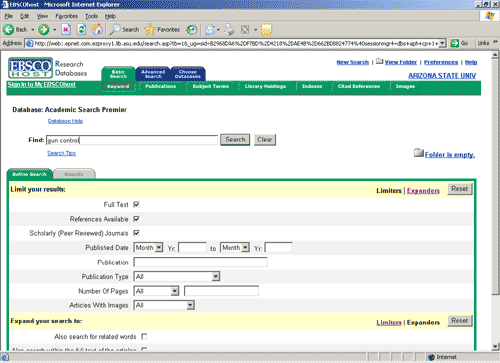
When we run the search we find that, to our continued good fortune there 14 articles on "gun control" which fit this tightened description:
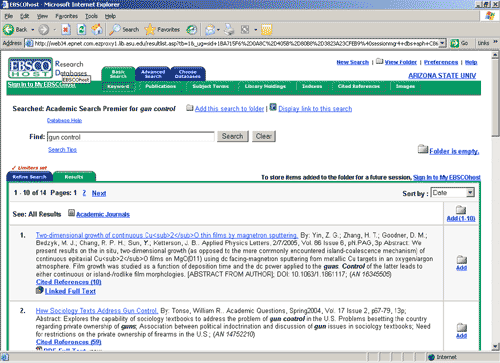 .
.
Again, any of these remaining 14 articles can be e-mailed to your e-mail address or printed at your convenience. It's literally as if you've just searched through 4700 publications discussing gun control and culled out only the ones that met very specific criteria.Now you're finally ready to harness the power of EBSCO to aid you in your research. Maybe, however, a little rest is in order first...

Authorization to use EBSCO screen shots was obtained from Rob Depaolo of Ebsco Information Services of Boston, Massachusetts by telephone at 2:58 AZ time on December 7, 2005. I learned, from my conversation with Rob, that Ebsco is particularly concerned about the presentation of specific results (abstracts and article), as they are the copyrighted works of the authors. Rob was very gracious and offered to advise me should I do more work with this in the future.
Last updated:
Wednesday, December 7, 2005 3:52 PM
 Perhaps the first thing a student in English 101 or English 102 needs when confronted with a research essay is access to library resources about the essay's subject. This project is an attempt to deal with those very students. Students in this situation often ask such questions as: What library resources should I consult? How might I find sources that are current enough to report the most recent status of social issues? Isn't the World Wide Web and the proliferation of pages on my topic enough? How can I just look at 'full-text' articles and not wade around in actual library bound volumes?
Perhaps the first thing a student in English 101 or English 102 needs when confronted with a research essay is access to library resources about the essay's subject. This project is an attempt to deal with those very students. Students in this situation often ask such questions as: What library resources should I consult? How might I find sources that are current enough to report the most recent status of social issues? Isn't the World Wide Web and the proliferation of pages on my topic enough? How can I just look at 'full-text' articles and not wade around in actual library bound volumes? 





 Why look in Academic Search Premier as opposed to other library databases? What makes this database more authoritative than a website? The reasons for using Ebsco a many. First and foremost, we're looking for information that is current and general in scope. Journal research is better done in specialized databases, but broader interests, like contemporary issues, make Ebsco a good fit. Timeliness of sources is critical in contemporary issues. For example, a student investigating the Iraq situation needs information that is updated daily. So many of the sources that one finds on the World Wide Web contain views of unmoderated individuals with the time and money to put up a website. Putting up a website does not, however, make one an expert on international affairs or even Hollywood romance.
Why look in Academic Search Premier as opposed to other library databases? What makes this database more authoritative than a website? The reasons for using Ebsco a many. First and foremost, we're looking for information that is current and general in scope. Journal research is better done in specialized databases, but broader interests, like contemporary issues, make Ebsco a good fit. Timeliness of sources is critical in contemporary issues. For example, a student investigating the Iraq situation needs information that is updated daily. So many of the sources that one finds on the World Wide Web contain views of unmoderated individuals with the time and money to put up a website. Putting up a website does not, however, make one an expert on international affairs or even Hollywood romance. 


 .
. 